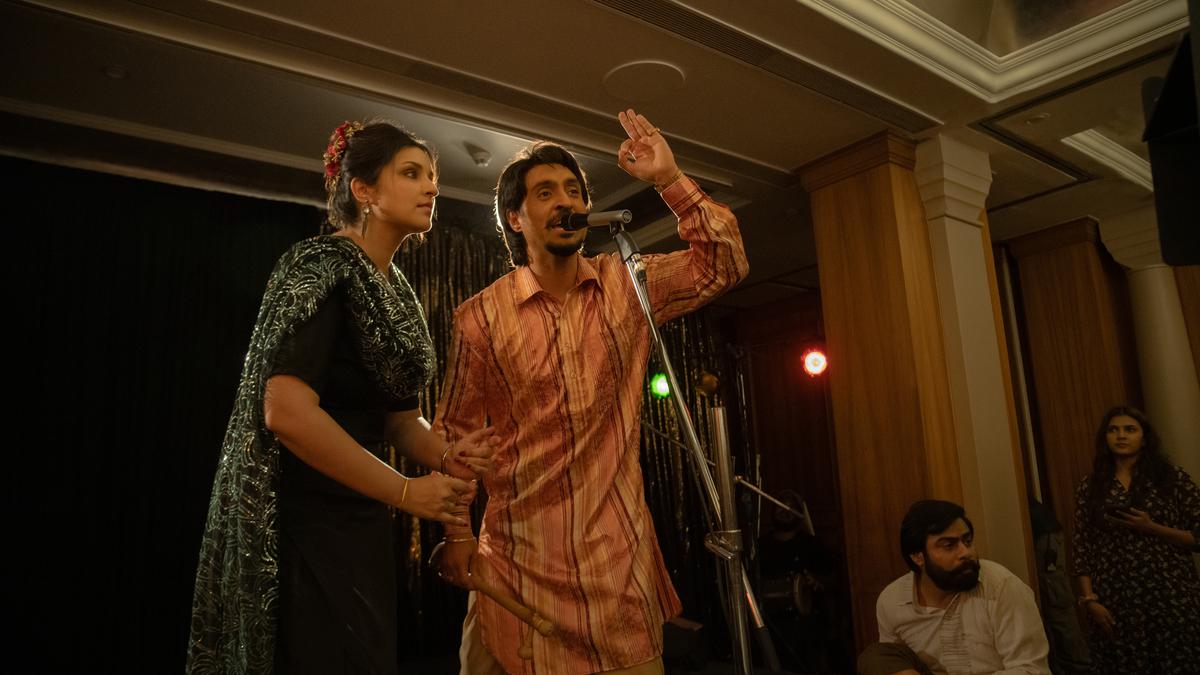This haunting episode from Punjab’s checkered past has been mined for cinematic fodder before, most inventively in Kabir Singh Chowdhry’s absurdist docu-fiction Mehsampur (2018). Now Imtiaz Ali, co-writing with his brother, Sajid, takes a crack at Chamkila. Audiences au fait with the bare facts — and assorted gossip — of the singer’s life and death won’t be persuaded anew. Ali’s film does not clear mysteries or exorcise any ghosts. It’s a fairly straightforward reading of the Chamkila myth, more a vibrant celebration than a deep dive. Yet, even in its squareness, it manages to offer a peek into the artist’s interiority.

This happens considerably late in the film. Chamkila (Diljit Dosanjh) has sold out his Toronto show, during his overseas tour of ‘87. His oily impresario is grinning from ear to ear, telling him how, when Amitabh Bachchan performed at the same venue a few nights ago, they had to add 137 extra seats. In Chamkila’s case, he proudly adds, that number has exceeded a thousand. We expect Chamkila to cheer up at this achievement; he’s been, all his life, a devout Bachchan fan. Instead, his smile fades like the morning mist.
No real explanation is provided for his blues: a narrator dryly notes that artists are strange creatures, and that Chamkila’s dejection resembled something like a loss, as though his childhood had suddenly ended. This moment, buried deep in the noise and tumult of Chamkila’s extraordinary life, is the best in Ali’s film, even if it’s wholly fictitious. Far from supplying answers about the slain Punjabi singer, mythologised to breaking point in popular discourse, it asks a gentle question: how comfortable was Chamkila, improbably baptized the ‘Elvis of Punjab’, with his meteoric rise?

Ali opens his tale with the fateful assassination, then proceeds to jumble up childhood and death, deed and aftermath, fact and hearsay. The lilting soundtrack begins to throb; images alter colour and form; superimpositions appear. The wailing ‘Baaja’ reaches an angry crescendo, complete with spoken lines, like Broadway meets protest street theatre. It is a carousel spin of a start, reminiscent of the grainy dream sequences in Tamasha (2015), or the swirling structural schemes editor Aarti Bajaj devised for Rockstar (2011).
This bracing prologue is followed by a mostly tame assembly of Chamkila’s life and times. An ordinary mill worker, he sweet-talks himself into the orbit of folk sensation Jinda (based on Punjabi singer Surinder Shinda), writing lyrics for him and bringing tea. A chance to open at a seething akhada announces his singing skills. He builds his reputation crooning lively duets, but is soon out of backers and a partner. His high-pitched delivery and endless bookings wear out most, but somehow Amarjot (Parineeti Chopra), tickled pink by his bawdy verses, stays on. They get married.
We know that Amarjot hailed from an upper-caste Jat family; Chamkila’s ancestors, meanwhile, were Chamar. Moreover, he was already married once, a fact he initially conceals from Amarjot (and Ali from us). There were other forces at play. The extremists roaming the countryside as well as religious chieftains had imposed strict curbs on culture and speech; the cops, cracking down brutally in response, weren’t any kinder. Chamkila was branded a baagi (renegade), a corrupting influence on family and youth. This made him vulnerable to all kinds of exactions and threats. There is a darkly telling scene where a bunch of thugs turn up at his doorstep, announcing they love his music before shaking him down for cash.
Ali barrels through the dark sociopolitical atmosphere of 80s Punjab, as you’d expect from a filmmaker of his (mostly romantic) persuasion. There is a constant softening of mood and tone, be it through the vivid 2-D animation sequences or A.R. Rahman’s pulsing original soundtrack. ‘Ishq Mitaye’ is pained but glorious, with its echoing refrain of ‘Main hoon Panjab’, while ‘Naram Kaalja’ is a perfectly drawn women’s folk number, lyricist Irshad Kamil having fun with the skittish imagery, riffing about “small sickles” and “snakes around thighs”. Despite Chamkila’s inflammatory repute, this isn’t a particularly provocative film, mindful of cultural norms in its chosen time.
Diljit Dosanjh had played a Chamkila surrogate in the Punjabi film Jodi (2023). His vocal prowess comes in handy in Ali’s film, which employs live recordings of Chamkila’s original songs. Here, he portrays Chamkila as a gentle dreamer, diffident and optimistic. It’s perhaps too sweet-natured a performance; the charismatic loucheness, and the searing blaze we occasionally glimpse in Chamkila’s eyes in old photographs, are weirdly amiss. Chopra perseveres in a limited part, and there are few female characters of note in the supporting cast: a version of Aditi Rao Hydari’s parasitic journalist from Rockstar turns up in this film as well.
Samuel John, Anjum Batra and Anurag Arora are memorable in smaller roles. Ultimately, this is less a film about Chamkila than the lives that gathered around him or were altered by him. As with all great artists, he inspired both envy and awe. From rivals to raconteurs to income tax agents, everyone had a Chamkila story to tell. Like moths, they flickered briefly in his light.
Amar Singh Chamkila is currently streaming on Netflix.






No comments:
Post a Comment